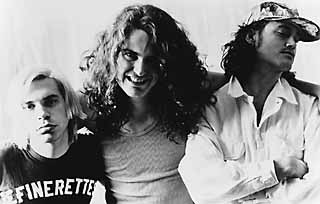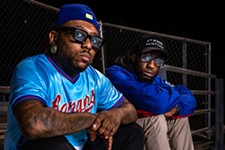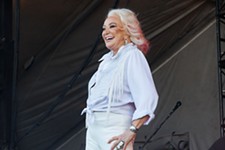What Is This?
By Raoul Hernandez, Fri., April 9, 1999
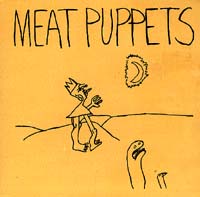
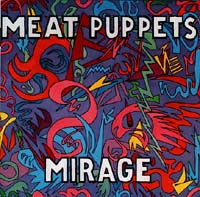
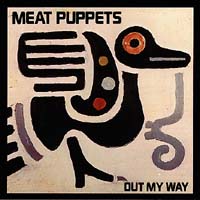
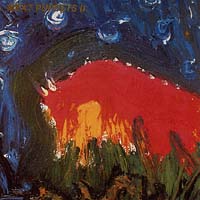
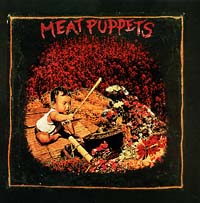
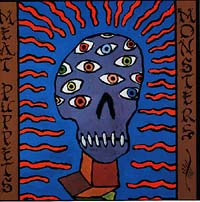
What is this? What is this music? What kind of artistic vision gave birth to this miasma of sound, in which a clear sparkling brook of bluegrass and country is fouled by toxic chemicals spewing forth runoff waste from the gutters of punk rock? What is this creature rising out of the brown bog, a fluffy, furry animal rubbing and purring against your leg one moment, a many-tentacled monster shrieking and flailing for your life the next? What is this, this -- thing -- and why do the words of Kurt Russell from the 1982 sci-fi horror classic of the same name come to mind? "I don't know what it is," growls Russell at one point, "but it's weird and it's pissed off." What is this?!?!
"Abstract rock & roll, pretty much," says Curt Kirkwood undramatically, crossing his legs and staring blankly at the wall of his Austin Rehearsal Complex space, "in the vernacular of the modern press. That's about as close as I would dare to describe it myself."
The next day, Derrick Bostrom dares further description over the phone from his home in Phoenix.
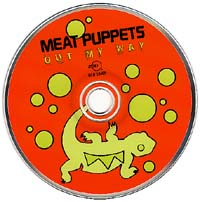 "What is this stuff? Well, what you're listening to is the sum total of the Meat Puppets' recorded input for the Eighties. Our lives. And that's not necessarily a question we didn't use to ask ourselves. I don't know. We kind of let the material speak for itself. Obviously, we're a group of serious misanthropes -- people who weren't looking to conform or get along. I think that much is obvious."
"What is this stuff? Well, what you're listening to is the sum total of the Meat Puppets' recorded input for the Eighties. Our lives. And that's not necessarily a question we didn't use to ask ourselves. I don't know. We kind of let the material speak for itself. Obviously, we're a group of serious misanthropes -- people who weren't looking to conform or get along. I think that much is obvious."
Oh, yeah. Definitely. In fact, after listening to that sum total -- six full-length albums and one EP, released between 1982 and 1989 on Black Flag axeman Greg Ginn's influential indie label SST -- it may be the only thing that's obvious: The Meat Puppets didn't want to be like anyone else. Weren't like anybody else. And now that another influential indie label, Rykodisc, has pulled the Meat Puppets' entire SST catalog (minus 1990's career retrospective, No Strings Attached) from the trash heap of Eighties post-punk punk rock, giving it their usual royal reissue treatment -- buttloads of bonus tracks and reams of new liner notes, artwork, pictures, and even CD-ROM videos -- one more thing becomes obvious: The Meat Puppets were an exceptional rock & roll band, one whose very nature was to defy categorization.
Emerging from the upper-class suburbs of Phoenix, Ariz., as the sludge of the Seventies coalesced into the shiny chromium turd of the Reagan era, the Meat Puppets were a three-headed beast who took their name from mankind even if brothers Curt (guitar/vocals) and Cris Kirkwood (bass/vocals) and drummer Bostrom wanted little to do with it. Products of a privileged but volatile upbringing at the hands of their notoriously wild, eccentric mother (herself victim to a similar upbringing), various stepfathers, and finally Catholic school institutionalization, the Kirkwoods were busy not becoming the lawyers/scions of business their mother had envisioned when mutual friends introduced them to Bostrom, also monied but nurtured creatively. Instant trio.
"It wasn't drilled into any of our heads that we needed to worry about the future," says Bostrom, "so we tended to be a little wild. Not necessarily car-stealing kids, but we liked to smoke pot and take acid and believed in super freedom. So that's what we did."
Punk rock. At the time, the Kirkwoods were playing what Bostrom calls "progressive music," but weren't very happy with it. Having both given up on college after a year or so, Bostrom says he and Curt were merely "marking time," trying to figure out how they could do music full time when someone turned the elder Kirkwood on to Iggy Pop.
"Curt came up to me one day and said, 'You know, I saw that there Iggy Pop fella.' And I said, 'Really? Well, here check this out.' And I knew what kind of stuff Curt liked; he was a Les Paul man, and was into Jimmy Page and some of the better guitar players in hard rock. So I let him check out my first Damned album and Raw Power, which were both pretty good introductions to guitar-oriented punk rock. He got into it, and came over. 'I learned a handful of these songs, so let's jam.' We jammed on a couple of songs and realized we were releasing huge amounts of cathartic energy."
In between unleashing said bursts of energy, Kirkwood and Bostrom smoked pot and slept all day, waiting for Cris to get home from school so they could practice. After working up a 60-minute set of covers, they began pounding out their own material, which was then recorded and used to bombard Bostrom's West Coast punk rock connections who were starting to tour through Phoenix. Before long, the trio had sold out its debut 7-inch, In a Car, five minutes of screaming chaos slammed into five songs; played to what Bostrom refers to as "the hip punk rock intelligentsia" in California; and caught the ear of SST's Ginn, whose verbal agreement with the trio resulted in the eponymously titled Meat Puppets the following year, 1982.
Offering a similarly cacophonous wreckage as the In a Car single, the Meat Puppets LP (mastered at 45rpm for vinyl), was as auspicious a label debut as the Minutemen had provided SST with two years earlier and Hüsker Dü would supply Ginn and company with the following year. The neo-hardcore, proto-thrash of Meat Puppets was at once part and parcel of the punk rock movement, yet with enough right-angle prog pretensions to signal a slightly different aesthetic. In particular, a stumbling, ramshackle go at "Tumblin' Tumbleweeds" stood out like the proverbial needle in a haystack -- a piece of straw stuck in the wild-eyed, gap-toothed grin of the trio. So did the freak-flag hysteria surrounding the recordings, which had been done over a three-day LSD binge in the studio.
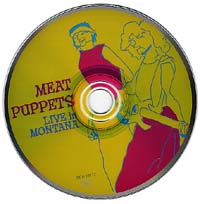 "With this band, that was the whole point," explains Bostrom. "That's one of the reasons we called it Meat Puppets. We were just gonna let go and see where it took us. We weren't looking to try and sound like anybody. We certainly weren't trying to sound like punk rock. It was a neat idea, but it's not like we actually admired punk rock, because it was quite a bit more lowbrow than we were. We wanted to weld our chops to the energy, the DIY thing. By the time the whole hardcore thing came in, we were like, 'Ugh. This is really lowbrow now.' So we switched over to a country thing, more or less deliberately."
"With this band, that was the whole point," explains Bostrom. "That's one of the reasons we called it Meat Puppets. We were just gonna let go and see where it took us. We weren't looking to try and sound like anybody. We certainly weren't trying to sound like punk rock. It was a neat idea, but it's not like we actually admired punk rock, because it was quite a bit more lowbrow than we were. We wanted to weld our chops to the energy, the DIY thing. By the time the whole hardcore thing came in, we were like, 'Ugh. This is really lowbrow now.' So we switched over to a country thing, more or less deliberately."
Quite. Nevertheless, no one -- certainly not the "the hip punk rock intelligentsia" -- was prepared for Meat Puppets II.
Released in 1983, Meat Puppets II set a precedent for stylistic divergence that the band would continue employing from one album to the next throughout their tenure with SST. Whereas Meat Puppets had been punk to the core, only the core of Meat Puppets II could be considered punk; this was tumbling tumbleweed music, a shambling, twangin' 'n' bangin' utterly disarming dose of Southwestern roots rock that twinkled with lysergic glee. Starting with the skittish country-punk of "Split Myself in Two," through the 90-second instrumental bluegrass rave-up "Magic Toy Missing" and peak Seventies-era Neil Young giddy-up of "Lost," down to the nursery rhyme stomp of "Lake of Fire" and blithely tweeting closer "The Whistling Song," Meat Puppets II was three distinct decades' worth of rock & roll filtered through three misanthropic punk rockers.
Connected by superior songwriting ("Plateau," "Oh, Me"), lit up by virtuosic psychedelic guitar solos, and made "gelatinous" by Spot-on production work, Meat Puppets II was instantly hailed as an indie rock masterpiece right about the time those things were invented. By the time Kurt Cobain declared the album a seminal component of his musical education -- inviting the Kirkwoods to help him perform "Oh, Me," "Plateau," and "Lake of Fire" on Nirvana's MTV Unplugged special and soundtrack -- Meat Puppets II had already been in the Indie Album Hall of Fame for more than a decade.
"One of the things about the first album is that it represents a certain, tentative step," explains Bostrom. "The second album shows us in a much more self-confident mode. And one of the things we did was obviously tackle some of our influences, which was essentially mid-Seventies rock, pop, and country -- stuff like that."
In contrast to the first album, for which Bostrom had written the majority of the lyrics, Meat Puppets II was notable in the outing of Curt Kirkwood as the group's principal songwriter, a supremely talented guitarist who is credited with all the music and lyrics on the second album. According to Bostrom, the year between the release of Meat Puppets and Meat Puppets II had given fans plenty of opportunity for praise, Kirkwood stepping up to the challenge -- as he would time and again -- with prolific aplomb. Later, Cris Kirkwood also contributed songs to the band's catalog, but it didn't exactly take having your ears ripped off and fed to you to figure out who the Meat Puppets' songwriting monster really was.
"Oh, I had no doubt that the Meat Puppets would do well if we stuck to it," answers Bostrom when asked if Curt's songwriting skills were evident early on. "I had no doubt. It took a little bit longer than it could have. On the other hand, who knew back then that punk rock was gonna be particularly popular, certainly in its post-Nirvana way. Back then, it was just a question of beating out our peers. Meanwhile, as we were doing it in Phoenix, other bands were doing it all over the country. By the time we put out Meat Puppets II, there was a fairly good little network of clubs we could play, thanks to bands like Black Flag who were touring incessantly."
So they toured. And toured, and toured, forging a reputation for trio tightness and total unpredictability, the band just as likely to break into Marty Robbins' "El Paso" as they were a Black Sabbath medley or "Waltzing Matilda." It was a punk rock show all right, only with real songs running the spectrum from country/bluegrass/folk to hard rock and heavy metal, all played with a jazz-like sense of unpredictability and improvisation. In between, they cranked out one album after another, all of them markedly different from the last and yet all of them somehow connected to the previous one -- as if it were all one long song. Curt Kirkwood's songwriting, a farcical blend of drug-induced paranoia and existential sincerity -- smiling one minute, snarling the next, always fun -- kept the machine running. Not that it was all him.
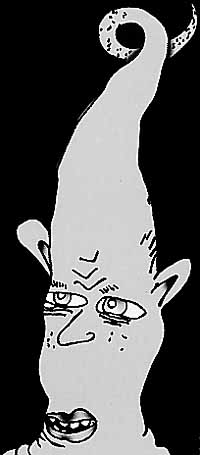 "Cris had a huge influence," says Bostrom. "Cris' tastes are all over the records. His tastes are the more avant-garde, the more un-rock, jazzy type of thing. Curt's thing, especially these days, is much more mainstream. I heard one review say it was almost bar rock, and I read another review saying there's hardly any of that jazz/fusion/country in it anymore. Well that's largely Cris' and my influence. Cris' tastes are very non-hard rock, while mine are very pop. So, what you get from Cris is a certain level of inventive, arrangemental musicianship, and what you hear from me is that really more concise pop."
"Cris had a huge influence," says Bostrom. "Cris' tastes are all over the records. His tastes are the more avant-garde, the more un-rock, jazzy type of thing. Curt's thing, especially these days, is much more mainstream. I heard one review say it was almost bar rock, and I read another review saying there's hardly any of that jazz/fusion/country in it anymore. Well that's largely Cris' and my influence. Cris' tastes are very non-hard rock, while mine are very pop. So, what you get from Cris is a certain level of inventive, arrangemental musicianship, and what you hear from me is that really more concise pop."
Following the critical and commercial success of Meat Puppets II -- commercial success being relative with indie label distribution (Bostrom estimates most of the band's SST albums sold in the 10K-20K range) -- 1983's Up on the Sun cemented the group's reputation for memorable melodies played against an animated backdrop of musical unpredictability; following that, 1985's Out My Way EP packs a decidedly Seventies, AOR-style punch, while 1987's "psychedelic epic" Mirage sparkles mirror-ball-like just as Huevos, also released in '87, kicks serious CCR grit off its Texas-style boogie. Monsters, the band's last album on SST (1989), is metal all the way. It may all be one long song, but what kind of whacked out song is it, exactly?
"I think it's blatantly and purposefully surrealistic at times," says its creator, Curt Kirkwood, "only in that I don't really write in imagery, I just remove things. I edit very heavily, and I wind up with imagery in that way. It's kind of like Burroughs in a sense, except I don't actually take things out of a hat.
"And then I'm pretty influenced still by my childhood, weird stuff like Disney cartoons -- just cartoons in general. A lot of stuff like that: Johnny Quest and the Monkees, Beatles really heavily, and CCR -- all the stuff when I was a little kid -- and then Bobby Sherman, Petula Clark, and heavy Jimmy Webb influence through Glen Campbell. You know, 'MacArthur Park.' I saw the same imagery in 'MacArthur Park' as I did in 'Strawberry Fields Forever,' for instance. You know, for a little kid, it's just about parks: Paisley Park, MacArthur Park, Strawberry Fields, whatever. I'm still the same pretty much."
Yes, well ... fine. Richard Harris in a mop cut and holster running from Elmer Fudd. There's more, though: showtunes, musicals, "Sixties movie-era Elvis." Now there's a fine beast -- Elvis -- and like any guitar player worth a busted string, Kirkwood cites Presley's guitarist James Burton as a prime influence, as well as Grady Martin, Marty Robbins' guitar foil. Hardcore country. Actually, it all began with clarinet in the fourth grade, but Kirkwood didn't like that, and since "mother insisted" he take some kind of music lesson, he picked the guitar, which came with classical guitar lessons. In 1970, 11 years old, he got his first electric guitar and it wasn't long before he could play "Satisfaction," "Iron Man," and "Smoke on the Water." Hard rock. Led Zeppelin, ZZ Top, Lynyrd Skynyrd.
Something's missing, though -- the heavy psychedelia. Kirkwood mentions thinking the Doors were a lot of fun when he was little. No. Maybe it's just the drugs?
"They were all concept records," laughs Kirkwood. "The first one was our LSD record. We were three days in the studio and we tripped the whole time. And it was really cool, and really trying, too, because we went insane. The second record was our ecstasy record. That's why people like that record so much, I hate to tell you. Then the weed album, Up on the Sun. That's the pedestrian album. Weed and alcohol. I did that whole thing in 72 hours, straight through -- recorded and mixed it."
"You would think that would be the coffee album," snorts Bostrom at Up on the Sun's three-day turnaround, "but they were all pot records."
It's the drugs, or rather the acknowledgement of their role in the Meat Puppets, that plugs right into an influence cited throughout the new liner notes on the Rykodisc reissues. A group whose entire purpose was psychedelicizing American roots music and rock & roll. A band covered as a bonus track on the new version of Meat Puppets, which adds 13 extra songs as well as the In a Car single. No, not the cover of "Everybody's Talking." The Garcia, Hunter, Kreutzman credit -- "Franklin's Tower." The Grateful Dead.
"The Dead was a huge influence for me starting a band," acknowledges Kirkwood. "Musically, you can't be into the Dead without having it creep in. I hear the Dead's influence in stuff, I hear other people's music in the Grateful Dead; I hear the Who in the Dead, the Stones. In terms of the flow, a lot of times what made the Dead cool is they didn't claim it for their own, and that's what's cool about music; you can get involved in something that you have no idea what it's really about.
"I saw that as a teenager: 'That's the only excuse to do it -- so you can jam out.' So you can get wasted and jam, turn yourself inside out. Do all the cool musical things -- whatever you want. Just in your imagination, do whatever -- completely unheard-of things -- and still have the basis of a single tune. In that, they were a huge influence. I'm sure a lot of the guitar playing snuck in, too."
Given Grateful Dead guitarist Jerry Garcia's debt to bluegrass, Kirkwood's own love for the genre makes even more sense.
"Heavy Doc Watson influence from my childhood," agrees Kirkwood. "Early on. Seeing the Dillards on Andy Griffith. Just seeing bluegrass in general. My grandmother lived in North Carolina. That was the folk music I understood as a kid. That was folk music to me. Peter, Paul & Mary was fucking weird to me, just like the Rolling Stones were fucking weird when I was a kid. I didn't like anything political. I still don't. So I saw bluegrass as being way beyond that, completely ethereal -- heavenly strains."
Cartoons collapsing into classical music, careening into country, bluegrass, and folk, colliding with hard rock, heavy metal, and Southern boogie. All brought together Grateful Dead style. A creature worthy of one of Kirkwood's twisted illustrations (he had originally envisioned himself in the graphic arts field). Meat Puppets recipe.
"And the Beatles," injects Bostrom. "For our generation, the Beatles were always held up as the model, the band that started doing one thing and then never said they couldn't do anything and then did as many different things as they could. That was the model internalized by our generation. They were the most successful rock band, so how could you lose doing what they did?
"We had self-confidence, so every record was recorded in a different way. Either we used electronic drums, or we used a click track, or we used heavy overdubbing. Just different studio assaults, different ways of doing it; jamming the stuff out, then writing the lyrics as we went along, or coming into the studio where everything was completely demoed or finished. We tried all sorts of different ways. It wasn't an accident. We liked the Beatles."
|
|
The Recordings
Up on the Sun
Bostrom: First of all, Meat Puppets II was recorded in the spring of '83 but wasn't completed until the fall of '83. Up on the Sun was recorded in the spring of '85, so we had a long time to work on it. The fact that we had recorded Meat Puppets II and were unable to mix it until months later, which was very frustrating to us, and not something we were happy about at all, meant that when we went to record Up on the Sun, we were finished with it. That's why it took three days, 'cause we were going to go into the studio and be damn well done with the record and not wait around.
Chronicle: You worked with legendary punk rock producer and longtime Austinite Spot on Up on the Sun.
Kirkwood: He engineered the first one, and II, and Up on the Sun. He was our cohort on our most esteemed work. I haven't talked to him in a few years, but I was thinking of giving him some of these reissues. It was largely Spot and I that put these records together. He made it really easy on Meat Puppets II and Up on the Sun. He made it really easy to get exactly what I wanted. He had no opinion. He really liked the live stuff and he was so into the punk rock thing from recording all those other bands -- Black Flag to the Buttholes and Germs. He had such a great ear. He wanted it to be "gelatinous," no matter what the case. That just seemed to describe it at the time. Still kinda does.
Out My Way
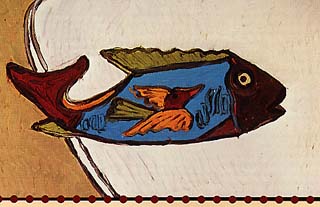
Bostrom: The engineer we worked with on the next three albums had cut his teeth on Tom Petty and Fleetwood Mac and had worked closely with Fleetwood Mac's producer, Keith Olson. So our engineer was a much more mainstream engineer. We decided to work at home, and take more time doing it, because even though we put our best foot forward with Up on the Sun, we didn't really want to just bang out a record in three days. We wanted to put more into it. Also, there's a certain level of sophomoritis on that record. How do you follow up something that has reached the public so well? Do you rewrite yourself? What's the plan? We had been touring so much, as happens to any band who gets success, so we didn't really have as much time to put into working this stuff out, and just decided to do an EP. Like I say in the liner notes, our plans were somewhat derailed for the next record when Curt had his finger broken.
Because of that, it ended up being a little more different than we had planned. The one-two punch of Mirage and Huevos would have been more of a one-two punch of Out My Way and Mirage. But still, I think Out My Way has some of our best stuff on it, and I think it's got some of the best bonus tracks. It really fills out. The way it stands now, it represents a much fuller picture. It's got more country and hard rock. The original six-song EP really just seems kinda like a sampler, a snippet. It never gives you any full sense of what's going on. There's no context to the songs. They just kind of happen one after the other. Like I said, with the bonus tracks it fills out. So yeah, one of the records I'm most proud of is the Out My Way reissue.
Kirkwood: This is when I went, "Oh, okay." I had been experimenting with recording, but I figured out some stuff around this time. This is the first of figuring out how to make records sound more like live recordings, while still getting your jollies in the studio. I also figured out that even though it sounded about as good as anything they were putting out on the major labels, since there was no payola behind it, it probably wasn't going anywhere. Probably is an understatement. We knew that by then. We knew that all along!
Mirage/Huevos
Bostrom:Mirage was our big Pet Sounds project. That's kind of our big psychedelic message record, in which all of our organo-themes come together ... By that time, our entire focus was music. Back then ['87], bands were getting deals -- Hüsker Dü, the Replacements, neither of whom were making music we particularly cared for -- not that we didn't like it. It's just that wasn't our kind of music. Part of what you hear on Mirage is us trying to make somewhat of a less oblique statement about what we were. It was like, "Here's how we're not like the Replacements. If you want to know in what way we're not like them, this is it. We are a progressive band. We're a high-energy, post-punk, psychedelic kind of band, and not a bar band." There's no question Mirage is a psychedelic thing.
Kirkwood:Mirage we couldn't really play live -- it wasn't very easy to play. And then we went and saw ZZ Top and I went, "Oh God. I've got all these fucking [guitar parts]. It'll just be easier if we play rhythm and blues stuff," though there's not that much on Huevos that's [ZZ Top]. There's a couple of songs that wouldn't have fit in on Mirage, that fit in perfectly for Huevos, because Mirage was too, too -- just too many guitars on it. We couldn't play it live. It was too complex, so we recorded Huevos.
Bostrom: All of our records are somewhat a reaction to what we did before, in the sense that we would evaluate that project and try to do better the next time. The thing about Mirage is that it had lost a certain level of spontaneity. The songwriting was a little obscure in certain parts. So we wanted to do a record that was rocking. A lot of the stuff from Huevos we were able to do quickly because we had been on the road again so long. And since we weren't doing a lot of the Mirage songs, we were working on the next record live. A good third of the Huevos album were songs that we didn't use on Mirage, 'cause they didn't quite fit.
Kirkwood: That was also the luxury of SST. At a time when you had to be really cool, like Chili Peppers cool, or R.E.M. fucking cool, I could turn around just when everybody thinks I'm totally the cat's meow from Up on the Sun and Meat Puppets II -- this whole stick your tongue up my ass but give me no money thing -- and put out an album with Texas boogie on it, because, hey, you know what? I'm actually a native Texan [born Witchita Falls, '59; Cris Kirkwood b. '60, Amarillo]. I've got every fucking base covered. People in Metallica listen to my shit. Fuck whatever people think about me.
Monsters
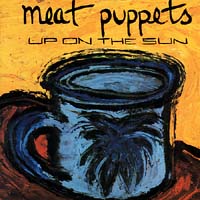
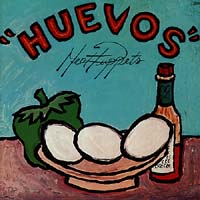
| Meat Puppets album artwork by Curt Kirkwood: The Van Gogh/Picasso years |
Bostrom: By putting out a record that was so loose, and so live [Huevos], the attitude was, "Oh, the Meat Puppets. I guess they're not gonna try to get signed after all. I guess they're probably ready to break up because they're putting such little effort into their records." By that time, by '88-'89, so many bands were getting signed to major labels that there wasn't enough good stuff on the independent labels to keep them afloat. The labels were going out of business. The distribution networks were dying; distributors were going out of business owing labels lots of money, and that would drag the labels down. So we were like, "Okay. Uh, we stuck it out as long as we could, now it's time to get signed."
Monsters started off as a series of demos for major labels, but like I said in the notes, it took so long to get these people interested that we decided to do another album. We were doing it. It was kind of a reaction to the whole Bon Jovi mentality of the time: "Let's try to show the world that we can be a mainstream rock band."
Kirkwood: That was just more artistic libretto, just because I realized I probably wouldn't have the chance to do it again. It was kind of like my version of the Residents' version of heavy metal. I'm not going to be that overtly strange. That's a fucking weird line: overt weird and what's truly strange. So, for me, to set a precedent and then try and -- not erase it -- but extrapolate, that makes sense to me. On my records, there's few things that are outside what I consider natural for me to do. Very few. But in terms of having everybody think I'm great or whatever, it's like at a certain point in the Eighties I realized there's a lot going on: I'm getting a lot of critical approval, but record companies don't understand how to market it, even though they all own my records -- all these people who won't sign me.
Like their generational peers (Hüsker Dü, Replacements, Soul Asylum), the Meat Puppets eventually made their long-awaited leap to a major label, signing to London Records (a Polygram subsidiary) in 1990 and releasing Forbidden Places the following year. Though general critical consensus claimed the album was too neat, too clean, Bostrom rightfully calls Forbidden Places "a wonderful album" that's "definitely neglected."
"It's such a good summation of our Eighties period," he says. "Unfortunately, it came out about a month before or after [Nirvana's] Nevermind, which changed the world's ear entirely. The sound of Forbidden Places was essentially obsolete by the time we put it out."
In a rare instance of music industry karmic cycles coming full circle, Nirvana made up for this particular instance of punk rock genocide by asking the Kirkwoods to guest on Unplugged, which aired prior to the release of the Meat Puppets' second album for London, Too High to Die. The Paul Leary-produced disc went on to sell in excess of a half million copies thanks to the "Backwater" single going Top 40, and in part because Cobain killed himself and the MTV special played round the clock. By the time No Joke followed up Too High to Die in 1995, heavy drug use had crippled the band, Cris Kirkwood running afoul of both the law and heroin addiction ["Shooting Star," Vol. 18, No. 18]. Moving to Austin in '97, Curt Kirkwood and his new, local version of the Meat Puppets (which at this time does not include Bostrom) are currently waiting on their recently restructured Unigram subsidiary to give them the go-ahead on converting new demos into their fourth London album.
In the meantime, and in addition to the seven SST reissues, Rykodisc has just released Live in Montana, a live recording from 1988 that even more than Forbidden Places serves as an excellent Meat Puppets catalog primer. Also in the works are plans to have Rykodisc make previously unreleased material available on the Internet via MP3 files (http://www.meatpuppets.com). Not that there isn't already too much to absorb; with bonus tracks such as a cover of the Rolling Stones' "What to Do" proving close relation to "Lost" on Meat Puppets II, or the priceless "Wish Upon a Storm" revealing itself to be the best song not on Monsters, there's more than enough to keep new and old fans alike entertained.
"That was my grand master plan," proclaims Bostrom. "That was my intention with each of the records. All the bonus tracks and liner notes were designed to bust open the record for a little better inspection, give it a sense of context -- both for the casual "Backwater"/Nirvana fan and for people who have followed the band from the beginning. Kind of rehabilitate our past in a world where people are listening to the Titanic soundtrack much too much."
Which brings to mind "Lake of Fire," an infectious dirge about frying in hell -- perhaps the quintessential Meat Puppets song.
"With that one," recalls its author, Curt Kirkwood, "I lived with Cris and Derrick, and probably Cris' girlfriend, Kelly. I don't know -- we had a fairly large crew there at that little house. They went to a Halloween party and I was disgruntled because I thought it was nonsense that adults should callously attempt to alter their appearances, that we are already sufficiently foul."
He chuckles.
"I was younger then. I just said, 'Talk about man's fall from grace. This is it.'"
Kirkwood laughs aloud this time.
"I was kinda a punker then."
You stayed home and wrote the song?
"Yeah, it was a toss-off. It's a cartoon."
Maybe that's what this is -- one long, twisted Disney cartoon. Uncle Walt would be shocked.





